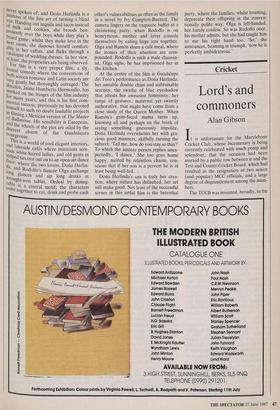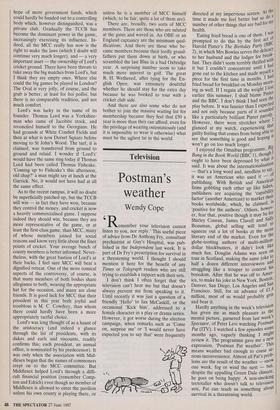Cricket
Lord's and commoners
Alan Gibson
It is unfortunate for the Marylebone Cricket Club, whose bicentenary is being currently celebrated with much pomp and splendour, that the occasion had been marred by a public row between it and the Test and County Cricket Board, which had resulted in the resignation of two senior (and popular) MCC officials, and a large degree of disgruntlement among the mem- bers.
The TCCB was invented, broadly, in the hope of more government funds, which could hardly be handed out to a controlling body which, however distinguished, was a private club. Gradually the TCCB has become the dominant power in the game, increasingly exercising its influence. In- deed, all the MCC really has now is the right to make the laws (which I doubt will continue very much longer), and — a very important asset — the ownership of Lord's cricket ground. There have been threats to take away the big matches from Lord's, but I think they are empty ones. Where else could the big games be played in London? The Oval is very jolly, of course, and the grub is better, at least for hoi polloi, but there is no comparable tradition, and not much comfort.
Lord's was lucky in the name of its founder. Thomas Lord was a Yorkshire- man who came of Jacobite stock, and reconciled himself to the Georgians. He had grounds at White Conduit Fields and then at what is now Dorset Square before moving to St John's Wood. The turf, it is claimed, was transferred from ground to ground and relaid. I wonder if 'Lord's' would have the same ring today if Thomas Lord had been called Thomas Fishcake. `Coming up to Fishcake's this afternoon, old chap?' a man might say at lunch at the Garrick. No, it would not have had at all the same effect.
As to the recent rumpus, it will no doubt be superficially patched up, but the TCCB will win — in fact they have won, because they control the money, and cricket is now a heavily commercialised game. I suppose indeed they should win, because they are more representative of the game, or at least the first-class game, than MCC, many of whose members joined for social reasons and know very little about the finer points of cricket. Your average bunch of county members is better informed. Never- theless, with the great bastion of Lord's at their backs, I feel sure MCC will beat a dignified retreat. One of the more comical aspects of the controversy, of course, is that many members of both bodies share allegiance to both, wearing the appropriate hat for the occasion, and many are close friends. It is good luck for MCC that their president in this year both joyful and troublous is M. C. Cowdrey, than whom there could hardly have been a more appropriately tactful choice.
Lord's was long thought of as a haunt of the aristocracy (and indeed a glance through the list of presidents, with its dukes and earls and viscounts, readily confirms this; each president, an annual office, is nominated by his predecessor). It was only when the association with Mid- dlesex began that the names of commoners crept on to the MCC committee. But Middlesex helped Lord's through a diffi- cult financial position (remember Comp- ton and Edrich) even though no member of Middlesex is allowed to enter the pavilion unless his own county is playing there, or unless he is a member of MCC himself (which, to be fair, quite a lot of them are).
There are, broadly, two sorts of MCC members. There are those who are saluted at the gates and waved in. An OBE or an England captaincy are the minimum qual- ifications. And there are those who be- came members because their lordly grand- fathers put them down at birth, or who scrambled the last Blue in a bad Oxbridge year. A surprising number seem to take much more interest in golf. The great R. H. Wethered, after tying for the En- glish Open, was extremely doubtful whether he should stay for the extra day because he was booked to tour with a cricket club side.
And there are also some who do not bother to join the massive waiting list for membership because they feel that £50 a year is more than they can afford, even for the privilege of wearing ostentatiously (and it is impossible to wear it otherwise) what must be the ugliest tie in the world.










































































 Previous page
Previous page